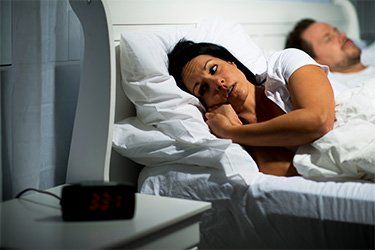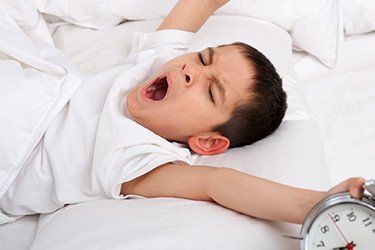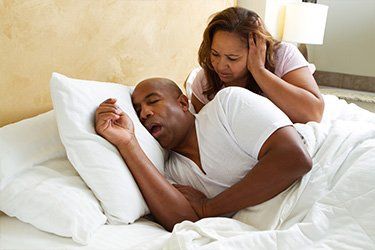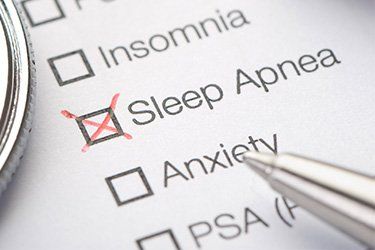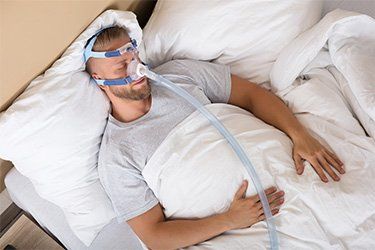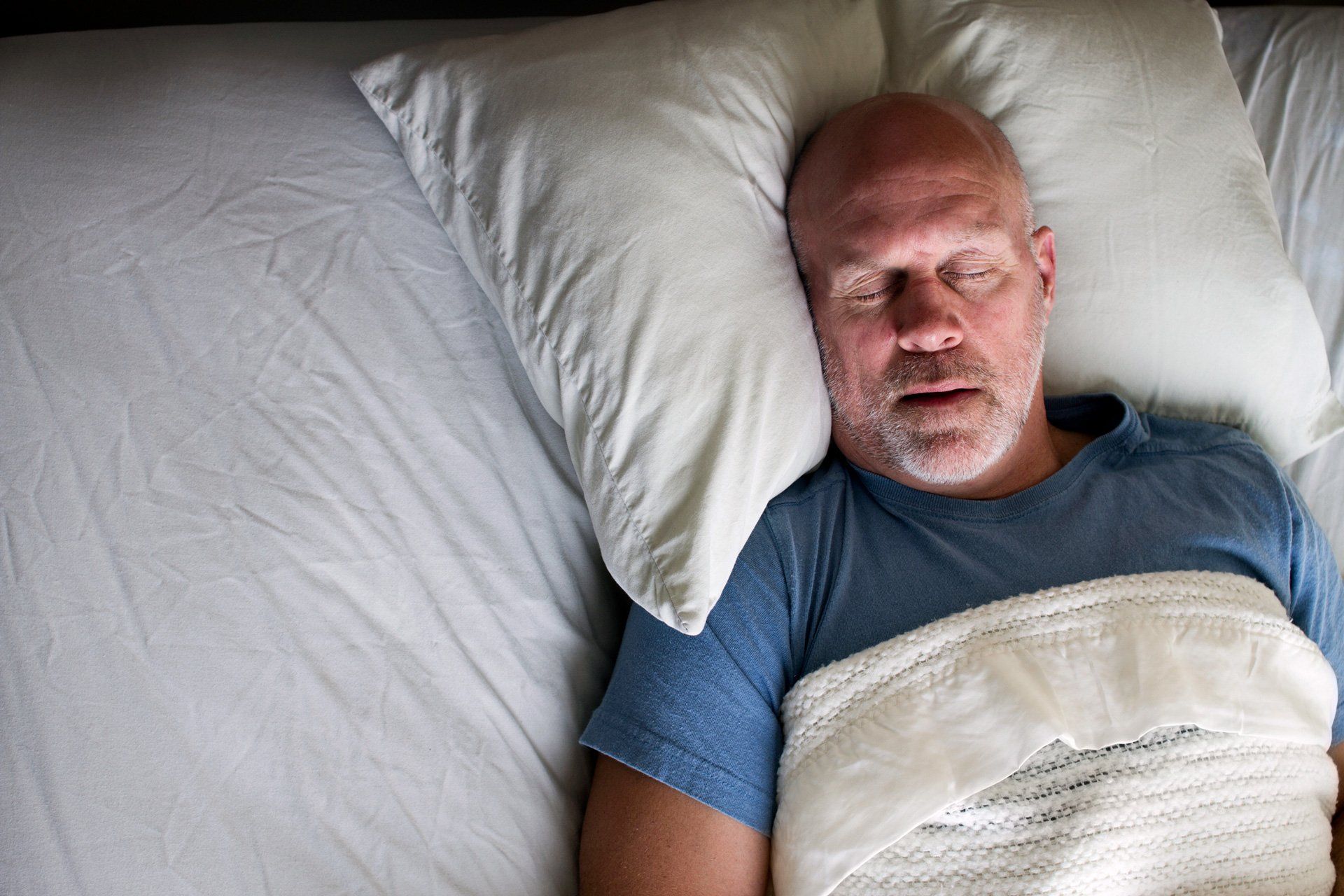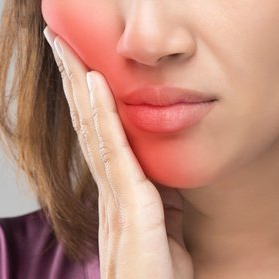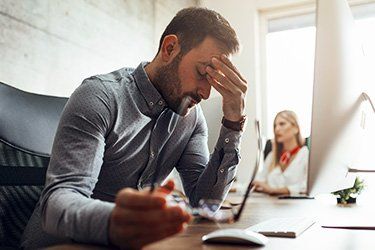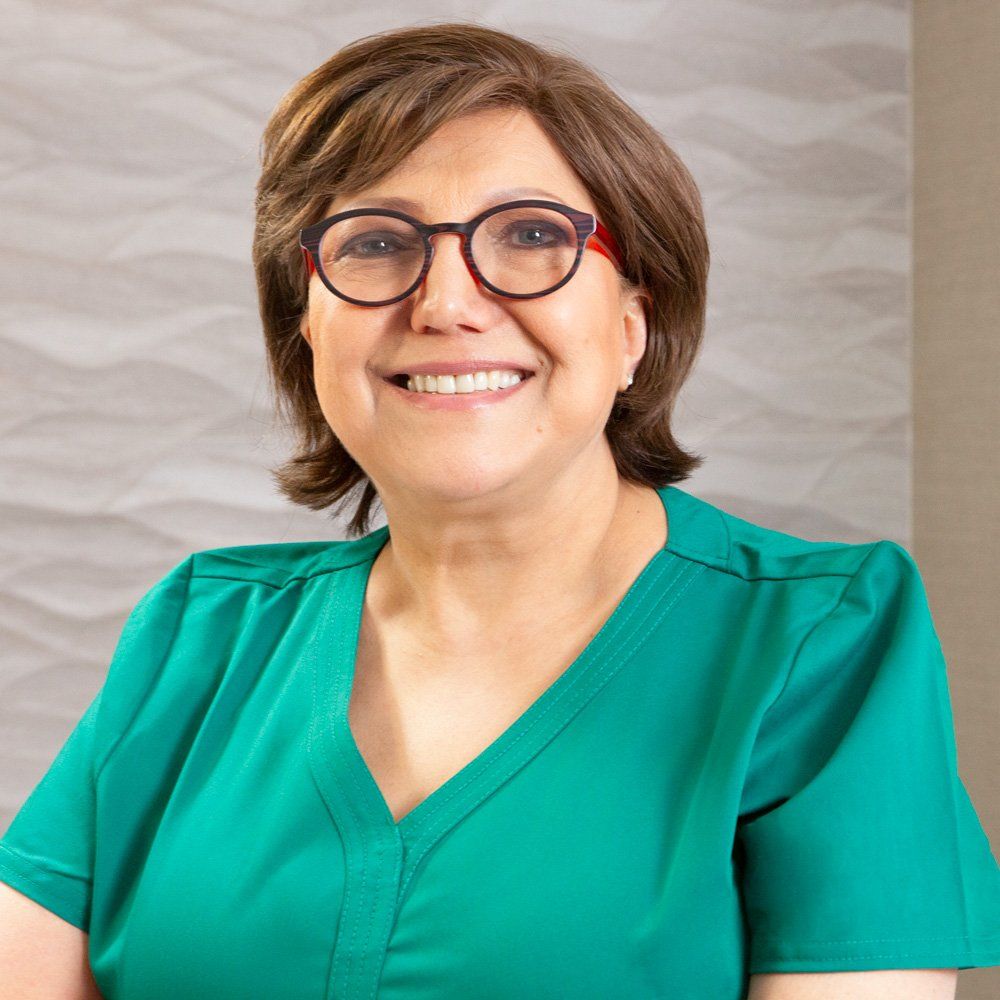Sleep Apnea and Anxiety and Depression
If you suffer from sleep apnea and wonder if this disorder could be associated with problems like depression or anxiety, you are exactly right.
If you care about someone who struggles to breathe at night and you’ve wondered if this disorder could be responsible for their low moods and irritability, you’re right too.
Research studies have shown that those suffering from obstructive sleep apnea also suffer from depression and anxiety in greater numbers than the general population. In fact, a European study found that of the participants involved, “…53.9% of the individuals had some degree of anxiety, while 46.1% demonstrated depressive symptoms.”
This connection makes it vital that a person suffering from apnea finds an effective solution. But which solution?
Common Sleep Apnea Solutions Don't Address the Underlying Problem
There are CPAP devices worn across the face that force air pressure into the patient’s airway. There are surgical procedures to reshape a person’s jaw and open their airway to reduce the risk of obstruction. There are also routine oral appliances that hold the jaw in a different position, and even a device that can be surgically implanted into your chest to combat obstructive sleep apnea syndrome.
The problem with these common solutions is that more often than not, they don’t relieve the patient’s anxiety and depression symptoms. Why? Because except for surgery, none of the above methods treat the underlying cause of the patient’s sleep disorders! Instead, they are lifelong commitments that can be uncomfortable and difficult to get used to using.
And for those suffering from anxiety disorders or major depressive disorder, not only can sleep apnea itself worsen their symptoms, but so can some of these common treatments.
Can Sleep Apnea Treatment Worsen Anxiety and Depression Symptoms?
In some cases, treatments like those mentioned above can actually make anxiety and depression symptoms worse. A CPAP machine, for example, works by wearing a mask over your nose (or both your nose and mouth) and forcing air into your airway at a constant pressure.
Many patients feel claustrophobic while wearing their CPAP mask because it is snug and restrictive. This can increase your anxiety and make it harder to fall asleep, which leads to sleep deprivation. In turn, the lack of sleep leads to feeling exhausted, which exacerbates depression symptoms during the day.
Many of the people who come to Breath of Life Dental (BOLD) for sleep apnea treatment want to know: is there a better solution out there?
A Better Solution for Obstructive Sleep Apnea Syndrome
A better solution is the Vivos Biomimetic Oral Appliance, an innovative new approach that encourages bone growth, even in adults, to remodel the bones that affect the airway. By wearing this custom oral appliance, the bones take on a more optimum shape in 12 to 24 months, on average. Sleep apnea becomes a problem of the past.
Keep reading to learn more about the correlation between anxiety disorder, major depressive disorder, and sleep apnea—and find out how Breath of Life Dental (BOLD) can help you get a good night’s sleep!
What Is Sleep Apnea?
Sleep apnea
is a type of sleep disorder that causes you to stop breathing intermittently throughout the night. Your brain recognizes that you aren’t getting enough oxygen, and it wakes your body up—usually with a choke or a gasp for breath. This can happen multiple times per hour, interrupting your sleep. If left untreated, sleep apnea can cause serious medical issues that can negatively impact your quality of life.
There are three different types of sleep apnea:
- Obstructive sleep apnea (OSA) This is the most prevalent type of sleep apnea, which affects an estimated 25 million adults in the United States alone. Obstructive sleep apnea happens when something obstructs your upper airway. If the muscles in the back of your throat relax too much, or if your tongue falls back against your airway when you are asleep, this can lead to obstructive sleep apnea. OSA comes in varying degrees, usually moderate obstructive sleep apnea or severe obstructive sleep apnea.
- Central sleep apnea (CSA) This type of sleep apnea affects an estimated 0.9% of adults over 40 in the United States. Central sleep apnea is caused by miscommunication between the brain and the respiratory muscles, often due to brain injury or disease. Your body can breathe without you having to think about it because your brain sends signals to your respiratory muscles to keep you breathing. But if those signals do not get sent, or if your muscles ignore the signals, you stop breathing. CSA also comes in varying degrees from moderate central sleep apnea to severe central sleep apnea.
- Complex sleep apnea (CompSAS) Sometimes during CPAP treatment for obstructive sleep apnea, a person can develop central sleep apnea. When this happens, it’s known as complex (or treatment-emergent central) sleep apnea syndrome. This type of sleep apnea is characterized by a combination of obstructive apnea events (where something blocks your airway) and central apnea events (where you simply stop breathing). CompSAS is estimated to affect between 2% - 20% of people who begin CPAP therapy, though only about 2% of cases persist as therapy continues.
What Are the Symptoms of Sleep Apnea?
The first step to getting treatment for your sleep apnea is to learn what symptoms you need to look out for. This is especially important if you suffer from anxiety or depression since many of the symptoms of those two conditions actually overlap with sleep apnea symptoms.
The most common symptoms of sleep apnea include:
- Waking up gasping for air or choking
- Loud snoring
- Having headaches in the morning
- Difficulty concentrating during the day
- Trouble concentrating and remembering things
- Excessive daytime sleepiness or exhaustion
- Sore throat or dry mouth in the morning
- Unexplained changes in mood, like depression or anxiety
- Sudden short temper or irritability
- Unusually low sex drive
- Insomnia (difficulty falling asleep or staying asleep)
- TMJ disorders (pain in the joint that connects your mandible to your skull)
These symptoms can negatively impact your physical and emotional health. Untreated sleep apnea can lead to serious medical conditions such as high blood pressure, heart disease, stroke, and even death. That’s why it’s so important to start treatment for your sleep apnea as soon as possible so you can improve your overall health and get a good night’s sleep.
Am I at Risk of Developing Sleep Apnea?
There are several different genetic and lifestyle factors that can increase your risk of developing obstructive sleep apnea. The most common of these factors include:
- Obesity, especially with excess weight around the neck
- A genetically smaller upper airway
- Family history of sleep apnea
- Older age (more prevalent in older adults)
- Gender (more common in men)
- Smoking
- Drinking alcohol
- Using sedatives or opiates.
If these conditions apply to you, then you should schedule an appointment with Dr. Maryam Seifi at Breath of Life Dental (BOLD). She will be able to advise you on lifestyle changes you can make to lower your risk of developing sleep apnea. If you already have obstructive sleep apnea, Dr. Seifi can also develop your treatment plan with the Vivos oral appliances.
What Is Anxiety Disorder?
Most people experience anxiety at some point in their lives because it is a natural response to stressful situations. But for an estimated
40 million adults in the United States, anxiety symptoms can persist even in a safe environment where there is no danger or stress to warrant the response. Such people may experience frequent and excessive uneasiness, distress, or fear during everyday activities. These feelings can be so intense as to cause a panic attack.
When your body is constantly reacting to unseen threats, it can have a negative impact on your physical health. Persistent anxiety can lead to health issues such as:
- Asthma
- Ulcers
- Vision problems
- Back pain
- Digestive trouble
- Heart problems
- Migraines
It is worth noting that the last two complications, heart problems and migraines, are also possible complications of untreated obstructive sleep apnea syndrome. Because the symptoms of obstructive sleep apnea and anxiety disorders overlap, it is possible that a significant number of those 40 million people could be affected by
both
conditions. But if the sleep apnea is never detected and treated, the anxiety symptoms will get worse.
What Are the Symptoms of Anxiety Disorder?
You may think that anxiety is simply feeling nervous or afraid, but it has a much larger impact on those who deal with this condition. Anxiety can often cause uncomfortable physical symptoms such as:
- Feeling nervous, tense, or restless
- A sense of impending danger, panic, or doom
- Rapid breathing or shortness of breath
- Pounding heart or increased heart rate
- Trembling
- Persistent worry or fear
- Muscle tension, aches and pains
- Dizziness
- Excessive sweating
- Difficulty concentrating
- Insomnia (difficulty falling asleep or staying asleep)
- Muscle weakness or fatigue
The last three symptoms, bolded above, are also common in people who suffer from obstructive sleep apnea. And because these symptoms are common in both conditions, it’s entirely possible that obstructive sleep apnea syndrome could be exacerbating your anxiety, and vice versa.
What Is Major Depressive Disorder?
Depression, also known as
major depressive disorder or
clinical depression, is a condition that affects a person’s emotions, energy levels, and interest in life. If nothing is done to improve this condition, depression can lead to other health issues and chronic pain that decrease your quality of life. While everyone experiences sadness or tiredness once in a while, depression is the persistence of negative feelings and thoughts accompanied with physical symptoms.
As mentioned earlier, an estimated 22 million people in the United States have sleep apnea. Another
15 million people are estimated to have a major depressive episode each year. Because the symptoms of sleep apnea and depression overlap, it is possible that a significant number of those 15 million people could be affected by
both
conditions. But if the sleep apnea is never detected and treated, the depression symptoms will get worse.
What Are the Symptoms of Major Depressive Disorder?
Depression is much more than simply feeling sad or tired. A person with depression may have trouble taking care of themselves, maintaining healthy relationships, being productive, or even doing the activities that used to bring them joy. Some common symptoms of depression include:
- Unexplained grief, sadness, or despondency
- Loss of interest in favorite hobbies, sports, or sex
- Passive or active suicidal ideation
- Stuck attention on guilt or past failures
- Low self-worth, high self-blame
- Sudden change in appetite, either eating too much or too little
- Sleeping too much
- Not getting enough sleep at night
- Feeling exhausted throughout the day no matter how much sleep you get
- Sudden anxiety, agitation, or restlessness
- Trouble thinking, concentrating, making decisions and remembering things
- Unexplained mood swings, angry outbursts, irritability or frustration
- Unexplained physical problems, such as back pain or headaches
The symptoms bolded above are
also
symptoms of obstructive sleep apnea. And because these symptoms are common in both conditions, it’s entirely possible that obstructive sleep apnea syndrome could be exacerbating your depression, and vice versa.
Could the Overlapping Symptoms Be a Coincidence?
There is a correlation between sleep and mood, and sleep deprivation (if it is prolonged, as with obstructive sleep apnea, anxiety and depression) can wreak all kinds of havoc on your body.
The issue with these conditions is that they each can impact your sleep and slowly worsen your physical health, which makes anxiety and depression symptoms worse. And stronger anxiety and depression symptoms can, in turn, impact the quality of your sleep. When you have obstructive sleep apnea (OSA), you don’t tend to remember waking up multiple times per night to breathe. So you may simply attribute your symptoms to depression or anxiety without realizing there is a physical,
treatable
condition that is making things more difficult for you.
In fact,
a 2019 study found that the prevalence of anxiety disorders and depression is higher in people who have obstructive sleep apnea than in those who are not affected by this condition. This offers further proof that sleep disruption can exacerbate anxiety and depression symptoms.
While we can not definitively say that obstructive sleep apnea (OSA)
causes depression or anxiety, the available research does suggest that OSA does cause extremely similar mental, emotional, and physical symptoms due to the negative impact on sleep quality. And if you want to improve your anxiety and depression symptoms, it may be worth a visit to Breath of Life Dental (BOLD) to see if obstructive sleep apnea could be a contributing factor.
Can Sleep Apnea Treatment Improve Anxiety and Depression Symptoms?
If you have both sleep apnea and anxiety (or sleep apnea and depression, or all three), it is possible that sleep apnea treatment can improve your anxiety and depression symptoms.
How is this possible? Because many of the symptoms of sleep apnea, anxiety, and depression are
also
symptoms of sleep deprivation. There are other factors involved in these three conditions, but each one of them can interrupt your sleep.
The importance of deep, restful sleep for your physical and emotional health cannot be overstated. Sleep deprivation can absolutely exacerbate your anxiety and depression symptoms—and on the flip side, getting a good night’s sleep can help lessen those symptoms and make them easier to handle.
Revolutionary New Treatment for Obstructive Sleep Apnea
At Breath of Life Dental (BOLD), we are excited to tell you that you are not limited to a CPAP machine or surgery to treat your obstructive sleep apnea! Dr. Maryam Seifi is highly trained and experienced in the field of dental sleep medicine, which she uses to offer patients relief from obstructive sleep apnea.
Dental sleep medicine
is the use of specialized oral appliances to treat sleep disorders like snoring and obstructive sleep apnea. This simple therapy is an excellent alternative to CPAP machines, airway surgery, jaw surgery, and other invasive methods of treating sleep apnea.
Dr. Maryam Seifi advocates for the Vivos system to treat sleep apnea because it is a proven, non-invasive treatment that can correct the underlying causes of obstructive sleep apnea.
And we have saved the best for last: once you have completed your treatment for sleep apnea using the Vivos system (which takes on average 12-24 months to complete), you will
no longer have to use the oral appliance to get a good night’s sleep!
How Does the Vivos System Treat Sleep Apnea?
The Vivos system uses comfortable oral appliances (something that you wear in your mouth, similar to a mouthguard) to treat the underlying causes of obstructive sleep apnea. Over time, your Vivos appliance will change the shape and position of your
maxilla
(upper jaw),
mandible
(lower jaw) and hard palate.
It works through exerting gentle, continuous pressure, similar to how your teeth get straightened with traditional braces or clear aligners. The pressure slowly corrects your jaws’ alignment and increases the size of your upper airway. By doing this, it reduces your risk of experiencing an obstructive event during sleep. What’s even more incredible is that the Vivos appliances can actually encourage forward growth of your jawbones (yes, even in adults!) which is what makes this treatment so revolutionary.
The Vivos oral appliances are removable and custom-fitted to your mouth. You will wear your Vivos appliance for about 12-15 hours per day over the course of your treatment to achieve relief from your sleep apnea symptoms. And once you are finished, you can experience the relief of deep, restful sleep for many years to come!
What Types of Vivos Appliances Are Available for Sleep Apnea?
There are two different types of Vivos appliances. Depending on your specific needs, Dr. Maryam Seifi will prescribe the best one to treat your obstructive sleep apnea.
- DNA (the Daytime-Nighttime Appliance). The DNA appliance treats sleep apnea by applying gentle and consistent pressure to your hard palate, maxilla (upper jaw) and mandible (lower jaw). Over time, it will expand your hard palate and encourage your jawbones to grow in the ideal shape. These two actions help to widen your upper airway and allow you to breathe freely when you sleep at night.
This appliance is meant to be worn both during the day and at night, and its discreet design looks similar to a retainer. It is a simple and comfortable treatment that will not interfere with your daily activities, and it can be taken out easily to eat and take care of your oral hygiene.
- mRNA (the Mandibular Repositioning Nighttime Appliance). The mRNA appliance treats obstructive sleep apnea by shifting your mandible (your lower jaw) forward to properly align with your maxilla (your upper jaw). Like the DNA appliance, the Vivos mRNA appliance also expands your hard palate to widen your upper airway and can encourage jawbone growth. This appliance is designed to be worn at night while you sleep, and most patients finish their treatment within 12-24 months of proper use.
As an added bonus, the Vivos oral appliances can also be used to treat snoring and temporomandibular joint (TMJ) disorder. Your TMJ is the joint which attaches your mandible (lower jaw) to your skull, and disorders of this joint can cause severe pain and chronic headaches. With the Vivos appliance, you can get relief from this condition without the need for surgery.
What Makes the Vivos System Better Than CPAP Therapy for Sleep Apnea?
The most common treatment for sleep apnea is the use of
continuous positive airway pressure (CPAP) therapy. This is a little machine with a connected mask that you wear when you go to sleep. CPAP therapy works by forcing air at a consistent pressure into your upper airway throughout the night. It is an effective treatment for obstructive sleep apnea, but most patients find the CPAP machine is too noisy, uncomfortable, and claustrophobic.
The Vivos appliance is different, and most of our patients think it is better than CPAP therapy because:
- It's a simple oral appliance that you wear for a set time period
- It's not a machine, so it doesn't make any noise or disturb your sleep
- It's custom-fitted to your jaw, which makes it more comfortable
- It will handle the causes of your obstructive sleep apnea
- It is not tight and doesn’t cover your nose, so it is less restrictive than a CPAP mask
Dr. Maryam Seifi has been using the Vivos system to help people with sleep apnea and other conditions find relief from their symptoms. With her decades of experience, Dr. Seifi can help you to get the good night’s sleep you deserve!
Find Out If the Vivos Appliance Is Right for You
To learn more, contact Breath of Life Dental today and ask about free educational seminars or request a personal consultation with Dr. Maryam Seifi. Call (301) 818-2653 , email info@breathoflifeteam.com or submit a request online.

